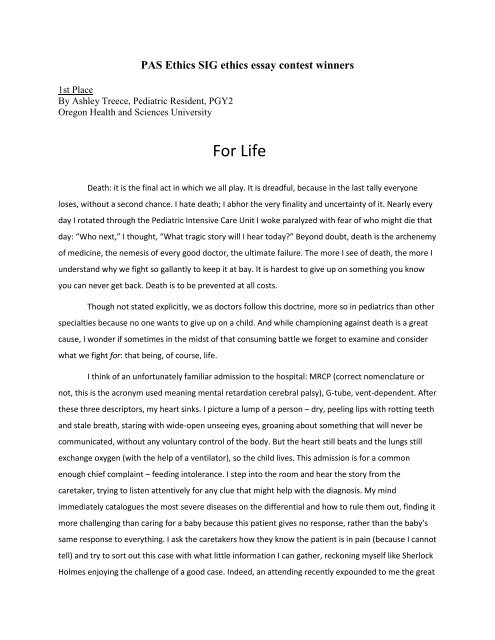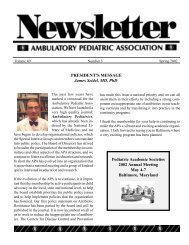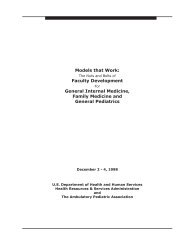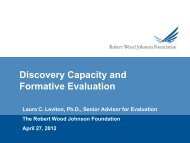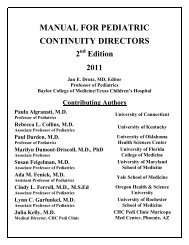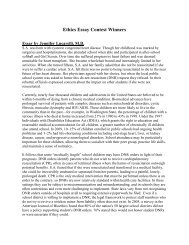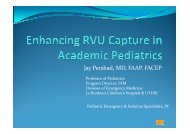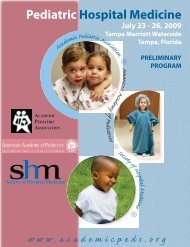to read the winning essays - Academic Pediatric Association
to read the winning essays - Academic Pediatric Association
to read the winning essays - Academic Pediatric Association
Create successful ePaper yourself
Turn your PDF publications into a flip-book with our unique Google optimized e-Paper software.
PAS Ethics SIG ethics essay contest winners1st PlaceBy Ashley Treece, <strong>Pediatric</strong> Resident, PGY2Oregon Health and Sciences UniversityFor LifeDeath: it is <strong>the</strong> final act in which we all play. It is d<strong>read</strong>ful, because in <strong>the</strong> last tally everyoneloses, without a second chance. I hate death; I abhor <strong>the</strong> very finality and uncertainty of it. Nearly everyday I rotated through <strong>the</strong> <strong>Pediatric</strong> Intensive Care Unit I woke paralyzed with fear of who might die thatday: “Who next,” I thought, “What tragic s<strong>to</strong>ry will I hear <strong>to</strong>day?” Beyond doubt, death is <strong>the</strong> archenemyof medicine, <strong>the</strong> nemesis of every good doc<strong>to</strong>r, <strong>the</strong> ultimate failure. The more I see of death, <strong>the</strong> more Iunderstand why we fight so gallantly <strong>to</strong> keep it at bay. It is hardest <strong>to</strong> give up on something you knowyou can never get back. Death is <strong>to</strong> be prevented at all costs.Though not stated explicitly, we as doc<strong>to</strong>rs follow this doctrine, more so in pediatrics than o<strong>the</strong>rspecialties because no one wants <strong>to</strong> give up on a child. And while championing against death is a greatcause, I wonder if sometimes in <strong>the</strong> midst of that consuming battle we forget <strong>to</strong> examine and considerwhat we fight for: that being, of course, life.I think of an unfortunately familiar admission <strong>to</strong> <strong>the</strong> hospital: MRCP (correct nomenclature ornot, this is <strong>the</strong> acronym used meaning mental retardation cerebral palsy), G-tube, vent-dependent. After<strong>the</strong>se three descrip<strong>to</strong>rs, my heart sinks. I picture a lump of a person – dry, peeling lips with rotting teethand stale breath, staring with wide-open unseeing eyes, groaning about something that will never becommunicated, without any voluntary control of <strong>the</strong> body. But <strong>the</strong> heart still beats and <strong>the</strong> lungs stillexchange oxygen (with <strong>the</strong> help of a ventila<strong>to</strong>r), so <strong>the</strong> child lives. This admission is for a commonenough chief complaint – feeding in<strong>to</strong>lerance. I step in<strong>to</strong> <strong>the</strong> room and hear <strong>the</strong> s<strong>to</strong>ry from <strong>the</strong>caretaker, trying <strong>to</strong> listen attentively for any clue that might help with <strong>the</strong> diagnosis. My mindimmediately catalogues <strong>the</strong> most severe diseases on <strong>the</strong> differential and how <strong>to</strong> rule <strong>the</strong>m out, finding itmore challenging than caring for a baby because this patient gives no response, ra<strong>the</strong>r than <strong>the</strong> baby’ssame response <strong>to</strong> everything. I ask <strong>the</strong> caretakers how <strong>the</strong>y know <strong>the</strong> patient is in pain (because I cannottell) and try <strong>to</strong> sort out this case with what little information I can ga<strong>the</strong>r, reckoning myself like SherlockHolmes enjoying <strong>the</strong> challenge of a good case. Indeed, an attending recently expounded <strong>to</strong> me <strong>the</strong> great
were <strong>to</strong>ld <strong>to</strong>, and because it was legal. As residents, we do <strong>the</strong> same. What if what we do now is akin <strong>to</strong>what <strong>the</strong> Nazis did <strong>the</strong>n – though on a much smaller scale? What if instead of wrongful death we arepracticing wrongful life?In our relativistic culture, ethics finds itself in a hard place. It is easy <strong>to</strong> become lost amongstdifferent truths, and easy <strong>to</strong> redefine right and wrong. As Arthur Leff argues in his paper “UnspeakableEthics 1 ,” without an “unjudged judge” <strong>to</strong> serve as evalua<strong>to</strong>r, “everything is up for grabs.” Yet he alsorecognizes that some actions are wrong and <strong>the</strong>re is no argument that can transcend this. Murderingchildren is evil. Torturing children is evil. I argue that not only is premature death wrong, but alsoostensibly extending physical life when <strong>the</strong> recipients of such well-meant practices have nothing <strong>to</strong> gainbut perfusion and ongoing oxygen exchange. The line between <strong>the</strong>se two schools of thought is difficult<strong>to</strong> define and I do not claim <strong>to</strong> have <strong>the</strong> answer. In older patients with an acute problem, this distinctionis often easier <strong>to</strong> make; in infants with so much that can change (yet generally does not), it is moredifficult. Still, “support of organic life” alone is not generally believed <strong>to</strong> be “an overriding andindependent goal of medicine 2 .” Most certainly, families could use a more candid explanation ofprocedures and <strong>the</strong>ir lifelong implications earlier in <strong>the</strong> disease course, because in my experience <strong>the</strong>seconversations often occur when <strong>the</strong> family is al<strong>read</strong>y <strong>to</strong>o committed <strong>to</strong> contemplate doing less. Asdoc<strong>to</strong>rs, we ought <strong>to</strong> be more familiar with what our goals are: not <strong>to</strong> heedlessly duel death with ourpatient trapped between us, but <strong>to</strong> thoughtfully propose and discuss what is in our patient’s bestinterest.Performing so many life-prolonging <strong>the</strong>rapies on such children feels inhumane. The onlyendpoint I can offer at this time is based on how I would ra<strong>the</strong>r feel in <strong>the</strong>se situations. Instead of anarchenemy, I would ra<strong>the</strong>r think of death in its appropriate time, in Tolkien’s words 3 , as man’s gift, tha<strong>the</strong> need no longer strive against <strong>the</strong> weariness of <strong>the</strong> world; and though never less sad, <strong>to</strong> be able <strong>to</strong>accept death as a normal part of life. Looking at <strong>the</strong>se children, I want <strong>to</strong> humanize <strong>the</strong>m, <strong>to</strong> give <strong>the</strong>m<strong>the</strong> grace of making death okay. Instead of hopelessly fighting death, I want <strong>to</strong> give <strong>the</strong>m back life.1. Leff, Arthur. "Unspeakable Ethics." Yale Law School Legal Scholarship Reposi<strong>to</strong>ry.HeinOnline, 1979. Web. Feb. 2013.2. Jonsen, Albert R., Mark Siegler, and William J. Winslade. "Quality of Life." Clinical Ethics: APractical Approach <strong>to</strong> Ethical Decisions in Clinical Medicine. New York: McGraw-Hill, HealthProfessions Division, 1998. 134. Print.3. Tolkien, J. R. R. The Silmarillion. Bos<strong>to</strong>n: Hough<strong>to</strong>n Mifflin, 1977. Print.
A physician’s choice <strong>to</strong> dismiss a family from a practice over vaccination refusalprecariously balances beneficence, social justice, au<strong>to</strong>nomy, and a sense of duty <strong>to</strong> <strong>the</strong> professionof medicine. Some pediatricians believe that refusal <strong>to</strong> follow medical advice represents a lackof trust in, and shared beliefs with, <strong>the</strong> physician (2). A pediatrician in Northwestern’sChildren’s Practice in Chicago recently <strong>to</strong>ld CBS This Morning, “If you don't believe in <strong>the</strong>fundamental thing we believe in, <strong>the</strong>n you need <strong>to</strong> go somewhere else (4)." We should notminimize <strong>the</strong> importance of <strong>the</strong>rapeutic and trusting relationships; however, some argue that <strong>the</strong>principal of beneficence requires us <strong>to</strong> help <strong>the</strong> patient and family by maintaining <strong>the</strong> relation. Inparticular, avoiding abandoning a child <strong>to</strong> ei<strong>the</strong>r no or substandard medical care (5) and flirtingdangerously with maleficence.Social justice implies minimizing population risks and distributing benefits equitablyacross society; ethically unimmunized children ‘freeload’ by avoiding <strong>the</strong> risks of vaccines andtaking advantage of herd immunity provided by vaccinated peers (6). Yet unimmunized childrensurely benefit from <strong>the</strong> close and careful care of a pediatrician who appreciates <strong>the</strong>ir increasedrisk for serious, vaccine preventable illness. Dismissing a family may compromise <strong>the</strong> health of<strong>the</strong> children in that family in order <strong>to</strong> protect o<strong>the</strong>r infants in our waiting rooms. Maximizingbenefits and minimizing risks for young infants of compliant parents may reduce exposure <strong>to</strong>vaccine-preventable illnesses, but we know that even in a fully immunized population infants indoc<strong>to</strong>rs’ waiting rooms continue <strong>to</strong> be exposed <strong>to</strong> a myriad of non-vaccine preventablecommunicable diseases. In our waiting room – in Chicago at <strong>the</strong> intersection of Wisconsinpertussis and Indiana measles – our infant patients have a much higher risk of complicationsfrom RSV coughed across <strong>the</strong> play tables than from vaccine-preventable infections. We do and
should not refuse <strong>to</strong> see sick and potentially contagious children in <strong>the</strong> name of beneficence<strong>to</strong>wards even <strong>the</strong> youngest, most vulnerable infants.The practice of dismissing a family for refusing vaccination challenges <strong>the</strong> principal ofpatient/family au<strong>to</strong>nomy. While young children have no au<strong>to</strong>nomy by definition, we generallyassume <strong>the</strong>ir families act in <strong>the</strong>ir best interests and have a right <strong>to</strong> make informed decisions onbehalf of <strong>the</strong>ir children without undue influence. Frustrated physicians may use terms like“neglect” and “child endangerment” in talking about vaccine refusal; however, <strong>the</strong>se familiestypically act out of attentive and fierce adherence <strong>to</strong> what <strong>the</strong>y believe <strong>to</strong> be <strong>the</strong>ir child’s bestinterest. The more important ethical question is whe<strong>the</strong>r <strong>the</strong>se families fulfill all of <strong>the</strong>requirements of informed consent and truly understand <strong>the</strong> risks and benefits of withholdingvaccination; if parents are mistaken or ill-informed <strong>the</strong>n <strong>the</strong>y may not be making au<strong>the</strong>nticallyau<strong>to</strong>nomous decisions. From a utilitarian view, one could argue that <strong>the</strong> threat of dismissal mayeffectively get some parents <strong>to</strong> vaccinate <strong>the</strong>ir children. One study showed that 10% of parentswho previously refused vaccines changed <strong>the</strong>ir minds when healthcare providers stated <strong>the</strong>ywould dismiss <strong>the</strong> child if <strong>the</strong> family did not comply (7). However, such threats leave physicianslooking down a slippery slope <strong>to</strong>ward unethical exercises in coercion.Vaccines are great advances of <strong>the</strong> last century and pediatricians can proudly claim anessential role in developing and disseminating <strong>the</strong>se preventive <strong>to</strong>ols. No doubt parents’vaccination refusal can feel like an affront <strong>to</strong> <strong>the</strong> core of pediatrics. When what we know <strong>to</strong> beright is challenged outright, we feel our blood rise and arguments fly <strong>to</strong>ward <strong>the</strong> tips of our<strong>to</strong>ngues. However, we must remember refusing parents typically have human passions as well.We recently attended an informal lecture on how <strong>to</strong> handle vaccine refusal titled “Top 10Myths About Vaccination and How <strong>to</strong> Combat Them.” Combat <strong>the</strong>m—do we really want <strong>to</strong> use
military language? We send residents in<strong>to</strong> exam rooms “armed” with a litany of vaccine data.Feeling a little invincible, <strong>the</strong>y march <strong>to</strong> do battle with “<strong>the</strong> myths” but come up against humannature and parental psychology. People, anecdotally parents in particular, hate <strong>to</strong> be <strong>to</strong>ld <strong>the</strong>irbeliefs are wrong. Many of us have seen a mo<strong>the</strong>r go stiff, arms crossed in defiance, and fiercelyglassy-eyed when pushed on <strong>the</strong> <strong>to</strong>pic of vaccination. It is said that our opinions are solidified aswe defend <strong>the</strong>m and <strong>the</strong>refore, <strong>the</strong> best way <strong>to</strong> win someone <strong>to</strong> your way of thinking is never <strong>to</strong>begin an argument in <strong>the</strong> first place (8). We want families <strong>to</strong> move <strong>to</strong>ward vaccinating andprotecting <strong>the</strong>ir children. Successful conversations require sympathy, patience, respect, andmore listening, at least at first, than lecturing. We must learn subtle and powerful persuasiveskills. When pediatricians dismiss families from practices for not following vaccinationrecommendations, it signals a failure <strong>to</strong> communicate adequately. Skillful conversations work; a2008 study reported that more than 35% of parents who decided <strong>to</strong> have <strong>the</strong>ir child immunizedafter previously refusing vaccines cited support as well as information received from <strong>the</strong>irhealthcare provider as reasons for changing <strong>the</strong>ir decision (7).Excellent communication skills are essential. We have labora<strong>to</strong>ry assays andradiographic studies, but most agree a good his<strong>to</strong>ry points <strong>to</strong> clinical conclusions more than 50tests. The fundamental groundwork for a good adolescent HEADDS screen, or a good asthmaaction plan, or a good ‘back-<strong>to</strong>-sleep’ discussion is good communication. Indeed, <strong>the</strong> AmericanBoard of <strong>Pediatric</strong>s lists “communication and collaboration” as one of <strong>the</strong> six principles ofprofessionalism that should be part of <strong>the</strong> core curriculum for pediatric residency training (9).We are a profession rooted in conversation, not dictates and mandates and threats, butconversation.
If we believe in <strong>the</strong> value of vaccination, we should consider that a family’s decision not<strong>to</strong> vaccinate reflects a failure of our professional responsibility <strong>to</strong> communicate effectively with<strong>the</strong>m. This perspective leads <strong>to</strong> an answer <strong>to</strong> <strong>the</strong> resident’s question “What do we do now?” If afamily refuses vaccination, we should listen, show respect, reassure, and through providingguidance, find a way <strong>to</strong> persuade. If we do not succeed, we should reflect on how ourcommunication efforts failed. If a child presents with a bacterial infection, we assess and <strong>the</strong>nlikely treat with an antibiotic. If <strong>the</strong> infection does not resolve, we reassess, seek more his<strong>to</strong>ry,and attempt a different antibiotic. If <strong>the</strong> infection persists still, we dig fur<strong>the</strong>r and broaden ourclinical considerations. We may follow <strong>the</strong> child more closely and dedicate more time andattention <strong>to</strong> <strong>the</strong> patient. No reasonable pediatrician would consider firing this child from his orher practice for having an annoyingly resistant infection that does not respond <strong>to</strong> treatment, evenif it puts o<strong>the</strong>r children in <strong>the</strong> waiting room at risk.Just as with antibiotics, conversations about vaccines do not work every time. Conjuringsincere empathy and respect and responding non-judgmentally are skills worth relying on when asmall part of us wants <strong>to</strong> backhand parents like Batman backhands Robin. With time,conversation will persuade a few – and a few is a few more than before. We suggest <strong>the</strong>professionally and ethically appropriate response <strong>to</strong> vaccine refusal involves letting go ofperceived affronts <strong>to</strong> our profession and our personal commitments <strong>to</strong> its values because, in <strong>the</strong>end, we share <strong>the</strong> same goal with parents who refuse vaccines: <strong>to</strong> protect <strong>the</strong>ir children.1. Healy C, Pickering L. How <strong>to</strong> communicate with vaccine-hesitant parents. <strong>Pediatric</strong>s.2011;127(S1): S127YS133. doi: 10.1542/peds.2010-1722S.2. Flanagan-Klygis E, Sharp L, Frader J. Dismissing <strong>the</strong> family who refuses vaccines: astudy of pediatrician attitudes. Arch Pediatr Adol Med. 2005;159(10):929Y933.http://archpedi.ama-assn.org.ezproxy.hsc.usf.edu/cgi/content/full/159/10/929. AccessedFebrurary 1, 2013.
3. American Academy of <strong>Pediatric</strong>s, Division of Health Policy Research. Periodic Survey ofFellows No. 48: Immunization Administration Practices. Elk Grove Village, IL:American Academy of <strong>Pediatric</strong>s; 20014. Jaslow, Ryan. Doc<strong>to</strong>rs “fire” patients who refuse vaccines for <strong>the</strong>ir children: Ethical?CBS News. March 20, 2012. Accessed Feb 6, 2013 at http://www.cbsnews.com/8301-504763_162-57379618-10391704/doc<strong>to</strong>rs-fire-patients-who-refuse-vaccines-for-<strong>the</strong>irchildren-ethical-/.5. Halperin B, Melnychuk R, Downie J, MacDonald N. When is it permissible <strong>to</strong> dismiss afamily who refuses vaccines? Legal, ethical, and public health perspectives. PediatrChild Health. 2007;12(10):843Y845. Accessed January 13, 2013 athttp://www.ncbi.nhlm.nih.gov.ezproxy.hsc.usf.edu/pmc/articles/PMC2532570/pdf/pch12843.pdf.6. Diekema D, American Academy of <strong>Pediatric</strong>s Committee on Bioethics. Responding <strong>to</strong>parental refusals of immunization of children. <strong>Pediatric</strong>s. 2005;115(5): 1428Y1431. doi:10.1542/peds.2005-0316.7. Gust D, Darling N, Kennedy A, Schwartz B. Parents with doubts about vaccines: whichvaccines and reasons why. <strong>Pediatric</strong>s. 2008;122:718Y725. doi: 10.1542/ peds.2007-0538.8. Carnegie, Dale. How <strong>to</strong> Win Friends and Influence People. New York, NY: Simon &Schuster, 2009.9. American Board of <strong>Pediatric</strong>s. Appendix F: professionalism. In: Program Direc<strong>to</strong>r'sGuide <strong>to</strong> <strong>the</strong> ABP: Resident Evaluation, Tracking & Certification. Chapel Hill, NC:American Board of <strong>Pediatric</strong>s; 2003.


